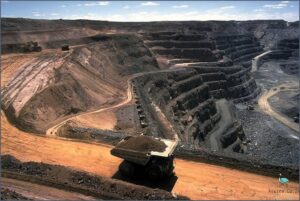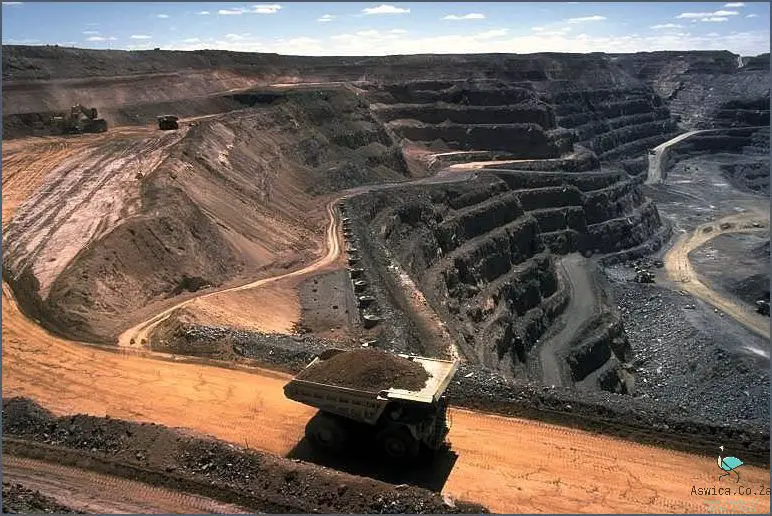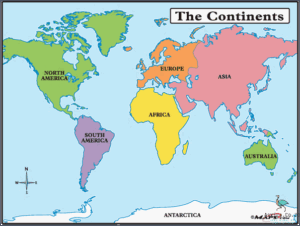
Coal is one of the most important minerals in South Africa as it is responsible for supplying around three quarters of the country’s primary energy needs. The country has vast reserves of coal, estimated to be around 30% of the world’s total, and is the fourth largest producer of the commodity. Coal mining in South Africa is a major contributor to the economy and provides employment opportunities for tens of thousands of workers. The industry is also a significant contributor to the country’s greenhouse gas emissions, with coal-fired power plants accounting for around 40% of total emissions. Despite these environmental concerns, coal is likely to remain an important part of South Africa’s energy mix in the coming years due to the country’s continued reliance on fossil fuels and the large reserves of the commodity that are available.
Contents
Why Coal Is Important To South Africa
Coal is one of the most important resources to South Africa. It has been mined in the country since the 1800s and is still one of the major sources of energy in the country. Coal is used to generate electricity, heat homes, and manufacture steel and cement, among other uses. It is also a major export of the country and has helped to create employment for many South Africans. Coal is abundant in South Africa, making it a key resource for the country’s economy. Furthermore, coal is a reliable source of energy and its availability ensures that the lights stay on and that industry continues to function. Overall, coal is a vital part of South Africa’s economy and its importance cannot be overstated.
Benefits of Coal to South Africa’s Economy
Coal has been an integral part of South Africa’s economy for centuries, and the country is still heavily reliant on the fuel source for its energy needs. Despite the growing popularity of renewable sources of energy, coal remains an important part of the South African economy and provides a number of benefits for the country.
For starters, coal is a relatively inexpensive energy source compared to other sources of energy. This makes it an ideal choice for South Africa’s power plants, which are responsible for providing the majority of the country’s electricity. Additionally, coal is abundant in South Africa, which means that it can be sourced from within the country’s borders. This not only saves money, but it also helps to create jobs and boost the local economy.
Coal is also a reliable source of energy. Unlike renewable sources of energy, such as solar and wind, coal is not subject to the vagaries of weather and can provide a steady, reliable source of energy. This makes it a great choice for providing energy to South Africa’s cities and towns.
Finally, coal is a relatively clean energy source. While it does produce some emissions, coal-fired power plants have been designed to reduce their emissions significantly. This helps to reduce South Africa’s carbon footprint, which is important for meeting global climate change targets.
In conclusion, coal is an important part of South Africa’s economy and provides a number of benefits. It is a relatively inexpensive, reliable, and clean source of energy that can be sourced from within the country’s borders. As such, it is an important component of South Africa’s energy mix and should remain an important part of the country’s economy for many years to come.
Impact of Coal on employment in South Africa
The impact of coal on employment in South Africa has been immense. South Africa is the third-largest producer of coal in the world and is heavily reliant on the resource for energy production, accounting for around 80% of the country’s energy needs. This dependence has led to a significant number of job opportunities, with coal mining and coal-fired power plants creating significant employment opportunities in the country.
The South African coal industry is responsible for providing around 440,000 direct and indirect jobs. This number includes the estimated 125,000 people employed in the coal mining sector alone. This is a huge contribution to the national economy and is one of the main drivers of economic growth in South Africa.
The coal industry in South Africa has a long and prosperous history. It has been estimated that the coal industry has been responsible for creating around 1.5 million jobs since the start of the 20th century. This has been possible thanks to the development of the sector, which has led to an increase in the number of mines and power plants in the country.

In addition to providing employment opportunities, coal is also very important for the South African economy. Coal is used to generate electricity in the country and it is also used in the production of other industrial products, such as steel and cement. This has led to an increase in the demand for coal, which has created additional job opportunities in the country.
The coal industry in South Africa has also been seen to have a positive impact on the environment. Coal-fired power plants produce less emissions than other forms of electricity generation, which helps to reduce air pollution and contributes to climate change mitigation. This is a very important factor in the sustainability of South Africa’s energy sector.
In conclusion, the impact of coal on employment in South Africa is immense. The sector has been responsible for creating a large number of jobs and has been a major driver of economic growth. The sector has also been seen to have positive environmental impacts, which is an important factor in the sustainability of the energy sector.
When it comes to South Africa’s energy landscape, coal is king. It is the main source of energy for the country, providing up to 70% of the country’s electricity needs. Coal also has a significant role in South Africa’s economy. The coal industry is a major employer, providing direct and indirect employment to more than 500,000 people. The sector is also a major contributor to the South African economy, with coal accounting for 8.5% of the country’s GDP in 2019.
Despite its importance to South Africa, coal mining is not without its environmental concerns. Coal is a non-renewable source of energy, meaning it is finite and limited. There is a finite amount of coal in the ground, and once we use it up, it’s gone. This means that we must carefully consider the environmental impacts of coal mining.
One of the most significant environmental concerns associated with coal mining is land degradation. Coal mining can cause huge amounts of soil and sediment to be displaced, which can lead to land degradation. This can have serious implications for the environment, such as reducing the amount of usable land, harming the habitats of local wildlife, and increasing the risk of flooding. In addition to land degradation, coal mining can also cause water pollution. Coal mining can release pollutants into nearby waterways, which can have a major impact on aquatic life.
Another major environmental concern associated with coal mining is air pollution. Coal mining can release particulate matter into the atmosphere, which can have a major impact on air quality. This can lead to a range of health issues, such as respiratory illnesses, heart disease, and even cancer.
Finally, coal mining can also have an impact on climate change. Coal is a major source of greenhouse gas emissions, and burning coal for energy releases large amounts of carbon dioxide into the atmosphere. This contributes to global warming, which can have a range of devastating impacts on the planet.
While coal is an important part of South Africa’s energy mix, it is important to consider the environmental concerns associated with coal mining. By taking steps to reduce air and water pollution, and working to reduce emissions, we can ensure that coal can continue to be an important part of South Africa’s energy landscape without causing further environmental damage.
Conclusion
South Africa is one of the most coal-dependent countries in the world. The country relies on coal for almost half of its electricity production and is the world’s second-largest producer of coal after China. Coal is also a major source of energy for the country’s industrial sector.
South Africa’s dependence on coal has led to environmental problems. Coal-fired power plants produce large amounts of greenhouse gas emissions, which contribute to climate change. Coal mining also causes environmental damage, including damage to water resources and the release of toxic pollutants.
Despite these environmental problems, coal remains a major source of energy in South Africa. The country is committed to expanding its coal mining and power production industries.
The importance of coal in South Africa underscores the need for countries to diversify their energy sources. Coal is a dirty and polluting energy source, but it remains an important part of the South African economy.




